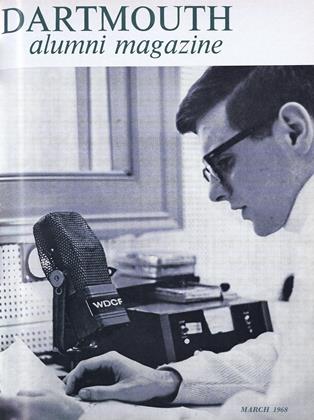Be prepared to be surprised by 36 ladies in love. And by what they say. "Fertilize them with recognition." "Be pleasantly persistent." "Look like a female always." "I owe it all to that auto [a Cadillac]." "Being a woman is a handicap only if she allow it to be." The 36 are in love not with men but with Life Insurance. Their pictures and biographies appear in The Women in OurLife-Insurance by Ethel B. Karene and Kenneth L. Anderson '3l, 105 pages, published by The Research & Review Service of America, Inc. The thesis is that women make topflight insurance salesmen because they are more persistent than men, more loyal, easier to train, better prospectors, and more successful in writing higher premium policies. They can back the hearse to the front or office door without causing the friction a mere man might. The right sort of lady may become so successful an insurance salesman that she may be called a Sellebrity and qualify for the Million Dollar Round Table limited to Great Leaders selling in one year more than $999,999.99 worth of insurance policies.
A Dartmouth man is co-editor of a new book for college students interested in speech and language therapy and for persons working with handicapped and retarded children and adults. He is Howard N. Sloane Jr. '54 of Salt Lake City, Associate Professor of Educational Psychology, University of Utah, who was formerly connected with Johns Hopkins, Southern Illinois, and Pennsylvania State. Operant Procedures in Remedial Speech and Language Training (Houghton Mifflin), consists of 19 articles, 12 specially written, and brings together detailed descriptions of remedial procedures based on remedial reinforcement theory for correcting a variety of speech and language difficulties.
Why should the 1600-mile Inter-American Highway stretching from the Panama Canal to the southern border of Mexico through some of the most spectacular scenery of the Western Hemisphere be empty of American automobiles? Ellis Briggs '21 raises the question in the February issue of The Atlantic Monthly and answers it in his article, "Places - The Inter-American Highway." He expands this central paragraph wittily and factually. "The answer is Central American bureaucracy, a bureaucracy of such stultifying and paralyzing torpor that it is almost as if the Great Wall of China had been dropped in chunks across the frontier crossings, sealing off each country from the next one."
"Trends in the Production of Treated Wood in the United States, 1951-1965" by Reginald H. Colley '09, Technical Director. Bernuth, Lembcke Co., Inc., presents a broad picture of the wood-preserving industry. He focuses on trends by using a limited text, tabular information, and trend linegraphs. Special consideration is given to the use of creosote, creosote solutions, and petroleum-pentachlorophenol. With increasing attention paid to local beautification, Mr. Colley points out that engineers are experimenting with new treatments because satis- factory" painting or staining is practically impossible for creosoted poles or most poles treated with ordinary pentapetroleum. More and more electric distribution lines are going underground. The scarcity of labor and the overall wood-tie situation from forests to tracks have led railroads to utilize concrete ties, especially on high-speed lines. The only remaining stands of large, long poles and piles is limited to the northwestern states and Canada. It is a long haul from Oregon to the Atlantic seaboard.
Thomas Falcon '65 (the author), Charles E. Breed '5l (the reviewer), Jay Evans '49 (adviser and author of our October article "The Story Behind a Book"), Roderick D. Stinehour '50 (the printer), and paddlers past and present are all happy that TheLedyard Canoe Club of Dartmouth has been chosen as one of the 25 Books of the Year published in New England in 1967.
 View Full Issue
View Full Issue
More From This Issue
-
 Feature
FeatureNew Edition of Webster Papers
March 1968 By John Hurd '21 -
 Feature
Feature"Intensive" Is the Word for It
March 1968 By Joan Hier -
 Feature
FeatureWDCR Reports
March 1968 By LAURENCE G. BARNET '68 -
 Feature
FeatureDrama Critic
March 1968 -
 Feature
FeatureWhite House Fellow
March 1968 -
 Feature
FeatureDiscount Dynamo
March 1968 By MARIE WHITE








